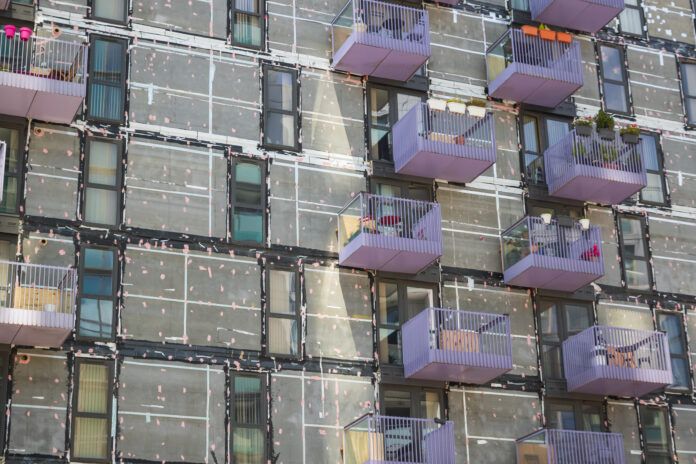The government has published its Remediation Acceleration Plan which looks to introduce new measures to ensure unsafe cladding is removed at a quicker rate.
It will set clear target dates for making buildings safe and will propose to introduce significantly tougher penalties for refusing to act.
The targets are:
- By the end of 2029, all 18m and over (high-rise) buildings with unsafe cladding in a government-funded scheme will have been remediated.
- By the end of 2029, every 11m and over building with unsafe cladding will either have been remediated, have a date for completion, or the landlords will be liable for severe penalties.
The plan will also be backed by investment in enforcement – so that local authorities, fire and rescue authorities and the Building Safety Regulator have the capacity to tackle hundreds of cases per year.
Alongside the plan, the government will publish a joint action plan with developers to accelerate their work to fix buildings for which they are responsible.
The Ministry of Housing, Communities and Local Government announced that at least 29 developers, covering over 95% of the buildings which developers are remediating themselves, have committed to more than doubling the rate at which they have been assessing and starting to fix unsafe buildings, meaning work on all their buildings will start by summer 2027.
To date, 95% of buildings with the same type of cladding used on Grenfell have been remediated. However, only 30% of identified buildings in England have been remediated, with potentially thousands more buildings yet to be identified.
Considering these issues, the government said the Remediation Acceleration Plan will:
- Expedite remediation of high-risk buildings with clear deadlines and penalties for non-compliance.
- Identify all buildings with unsafe cladding through advanced data assessments and the creation of a comprehensive building register.
- Protect residents from the financial burdens of remediation and improve their experience throughout the process.
Deputy Prime Minister Angela Rayner said: “More than seven years on from the Grenfell tragedy, thousands of people have been left living in homes across this country with dangerous cladding.
“The pace of remediation has been far too slow for far too long. We are taking decisive action to right this wrong and make homes safe.
“Our Remediation Acceleration Plan will ensure those responsible for making buildings safe deliver the change residents need and deserve.”
Building Safety Minister Alex Norris said: “Every resident deserves to feel safe in their home. By setting a clear timeline and firm deadlines, today’s announcement is a major step towards ensuring every building is made safe.
“Our Remediation Acceleration plan will fix buildings faster, identify all buildings with unsafe cladding and support vulnerable residents.
“This underscores our unwavering commitment to safeguarding residents and holding those responsible to account. We will not hesitate to actively pursue the owners of buildings who refuse to act.”
Industry reaction
Vivalda Group has criticised the government’s latest remediation targets as “unrealistic”, given the chronic shortages of skilled labour and materials, with its founder and chairman Peter Johnson welcoming the aims of the Accelerated Remediation Plan but is worried that a lack of skilled cladding installers and building safety inspectors will significantly hamper progress.
While he welcomed the government’s promise to publish a pipeline of remediation projects to promote confidence within the industry, Johnson was less convinced by the latest policy paper’s approach to addressing the skills gap.
He said: “The Construction Industry Training Board (CITB) estimates that the UK will need an extra 225,000 workers from 2023–2027, and a significant proportion of these must be involved in cladding. The government’s only strategy to address this huge gap involves granting overseas workers with the right qualifications Visas to work in England. While this might fill a few hundred vacancies at best, I was hoping to see a more meaningful initiative to encourage unemployed workers already in the UK to take up a career in construction.”
Johnson also voiced concerns over the number of approved building inspectors available to carry out this important work. He said: “Earlier this year, Lorna Stimpson, chief executive of Local Authority Building Control, wrote to the government to warn that a “significant number” of local authorities will be unable to undertake building control services from April unless a deadline to register and achieve certification was extended. We’ve not heard much about this since, then, but I fear that this structural issue has not been solved in just a few months.”
To fill the gap in on-site skills, Peter Johnson added that off-site fabrication could play a major role in creating a more efficient remediation supply chain. He said: “It makes sense that we should be making cladding remediation as simple as possible, while not compromising quality or safety. We operate from 11 UK locations, providing precise CNC cutting, drilling and fixing of brackets to boards which can then be installed on a building straight off the lorry. We think wider uptake of this proven, more innovative approach to remediation will play a big part in speeding up the process.”




